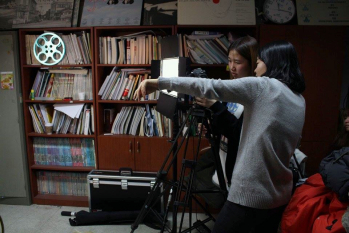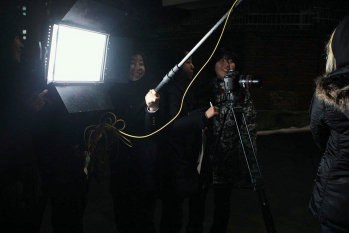
“Nights of hell” is the words that describe the nights at the military camp town. Murders and assaults were common words there. Women were beaten, strangled, and were insulted, but the country neglected the issue as “non-governmental diplomacy”. Enraged by what they have seen at the camp, Ewha students made a documentary film, advocating the rights of female sexual workers. This film won the compassion of its viewers so much that it won Young Forum Award at Berlin Film Festival and filmmakers were invited to a talk show by Korea Broadcasting System.
Founded in 1984, Noue is one of the primary school clubs of Ewha Womans University. By producing films, it aims to uncover and voice out the social problems and concerns of the current generation of women. In the 1980s to the 90s, it focused on the rights of Korean citizens and laborers, especially of females. However, its topic did not only cover female issues but also included broader social problems with themes varying from children living in demolished area, homosexuality, identity of Korean theater and freedom. Actively concerning themselves with the contemporary social issues, Noue marked its position as a leader of the trend of university films.
The contemporary Noue also has been building up a list of films that would prove their reputation. Coming into 2000s, Noue’s focus expanded and moved onto discussing young generations’ lives, mostly teenagers, university students and women.
“We try to express what we want to express as freely as possible. As we are students ourselves, most of the themes come from our concerns and emotions we experience as a member of younger generations.” said Yun So- jeong (Economics, 2), the current president of Noue.

The club recently completed its first film festival of 2014 in which they played three short films of average 20 minutes for each. Themes of these recent movies are on the similar track. One of the films, About Romance is about a man in his late twenties who tries to find “romance” after realizing how he sacrificed his dreams for the social norms he complied through all his life.
“Nowadays, most youths including myself find it difficult to think about what they really want to do but rather live lives that seem to be set for us. These situations all add up to accumulating the general atmosphere of emptiness in the society. We wanted to ask audiences ‘Why do we live the way we do?,” says Yun who also wrote the scenario of the film.
The other two movies also relate to the problems the younger generation is facing. “Do you Believe Noona?” employs feministic viewpoint about men taking equal responsibilities in pregnancy and abortion. However, the movie’s final message is not specific to the gender.
“Ultimate message of the movie is to warn the young public to be careful. Always use protection. Have a sense of dignity toward life.” said Kim Han-na (Korean, 2), the director of the movie.
The process of making a film seems simple enough on the outside. The club members, usually sophomores or seniors write scenarios and then numerous meetings are held to discuss the contents with the directors and the writers. After deciding upon the scenarios, the club recruits actors suited for the stories. Then, they start filming, edit the parts, and put on effects.
Even though the process does not seem so complex, the club members go through many difficulties, especially when the actual filming begins. “One of the most difficult parts in filmmaking is that we have to carry all the equipment by ourselves. We take twenty steps and then pass onto other members because we cannot bear the weight of them.” Yun recalls. “I remember one time I saw a male student of other club lifting the equipment so easily that I was a bit envious of them.”
There are many other difficulties as well including tension between the staff members and actors when they do not get along and the problem of finding the right place for filming.
“All of these problems have to be dealt with quickly and efficiently.” Yun and Kim said together. “Our ultimate goal is to efficiently use time and space and get the best angle that we can with our limits. We do not have time to “mull over” things. Usually all the tensions and emotions involved get solved after the whole filming business is over.”
These kinds of hardships have not been formed overnight nor has it been the problems only centered upon Noue. Filmmaking branch is difficult to pull through, but the club has been proving their diligence and efforts. Starting from the desire to voice out the rights of female sex workers, Noue has progressed outstandingly, and this year the club is already facing its 30th anniversary.
“The significance of Noue persists in that we do everything by ourselves.” Yun said. “Despite our difficulties, making a film is not an everyday opportunity. We love what we do, and I expect that is what keeps us together.”

